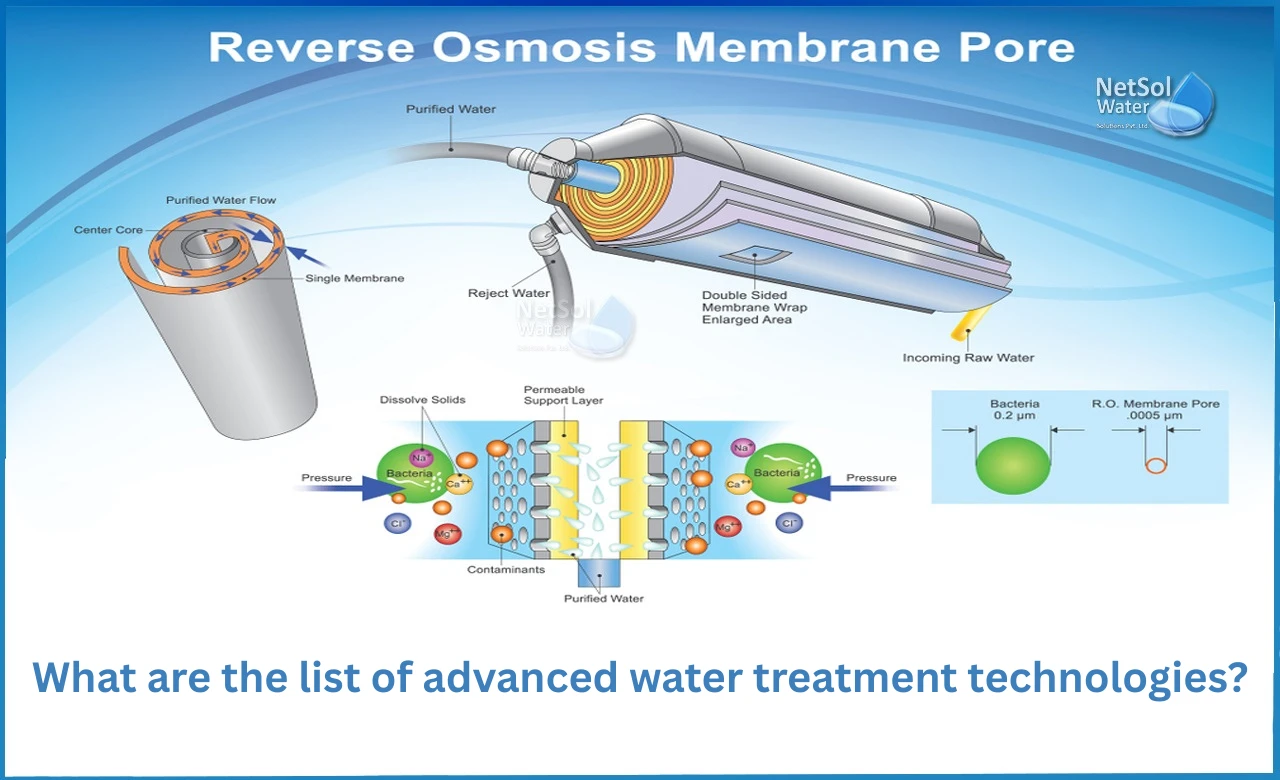
What are the list of advanced water treatment technologies?
Water matters for homes, farms, and factories. Netsol Water provides plants that clean water for many uses. People look to good water treatment to protect health, save money, and keep machines running well. A Water Treatment Plant must remove dirt, germs, and chemicals. It must also work for small sites and for large factories. Modern needs call for methods that do more than simple filters. They must handle tough pollutants and reuse water when possible. We will explore key advanced technologies that help plants run better. Netsol Water is the leading Water Treatment Plant Manufacturer and it offers many of these solutions.
Membrane Technologies
Membrane methods play a big role in modern water treatment. They remove tiny particles and many dissolved chemicals without using lots of chemicals. These methods fit well for places that must meet strict water quality rules. Let us have a look on some major membrane options and how they work.
Reverse Osmosis
RO pushes water through a very fine membrane to separate clean water from salts and dissolved pollutants. Systems use pressure to force water through pores that block most ions and molecules. This process suits desalination and for treating waste streams from industry. RO plants work best with good pre treatment. That step protects the membranes and keeps them running longer. Operators must control scale and fouling with simple cleaning plans. RO also creates a concentrate that needs safe handling or reuse steps. RO proves reliable for high purity needs and for places that must remove hard to treat contaminants. A Water Treatment Plant with RO can provide water for drinking for workers or for sensitive industrial use. Netsol Water installs RO plants that match site needs and that come with operation advice and service.
Ultrafiltration and Nanofiltration
Ultrafiltration uses membranes with larger pores than RO. It removes suspended particles, bacteria, and some large organic molecules. UF works well as a step before RO or as a standalone option for safe water for many uses. Nanofiltration sits between UF and RO. It removes small organics and some salts. NF helps soften water and cut down on some hard to remove pollutants. Both UF and NF need less pressure than RO. That lowers energy use and cost while keeping a high level of performance. These membranes fit well in Food and Beverage plants in hospitals and in municipal plants that want to reduce chemical use. Operators value these methods for stable performance and for their ability to protect later treatment stages.
Advanced Oxidation and Biological Hybrid Systems
Advanced chemical and biological methods help remove hard to break down pollutants. These plants work well when simple filters fail. They also prepare water for reuse with lower risk. Let us have a look on some important options and how they fit into a full plant.
Advanced Oxidation Processes
Advanced oxidation uses powerful reactive molecules to destroy persistent organic pollutants. Systems often mix ozone hydrogen peroxide and UV light to form hydroxyl radicals. These radicals attack complex molecules and break them into smaller and safer pieces. AOPs suit pharmaceutical waste streams dye removal and sites with organic toxins that resist biology. Engineers design these plants to match flow and pollutant loads. They add controls to keep operation safe and to avoid excess chemical use. AOPs do not leave a large solid waste stream. They can reduce the need for long term storage of contaminated water. This makes them a strong choice for many industrial plants.
Membrane Bioreactors and Hybrid Systems
Membrane bioreactors pair biological treatment with membrane separation. Microbes break down organic matter while membranes keep the biomass inside the reactor. This yields a high quality effluent with a small footprint. Hybrid systems mix MBRs with AOPs or with RO to meet strict reuse rules. These combinations let plants remove organics nutrients and tiny particles in a controlled way. MBR systems run reliably when operators manage biomass and membrane integrity. These systems save space and often cut down on sludge handling. Many facilities choose hybrid systems when they want to reuse water on site or meet strict discharge limits.
Read some interesting information for Sewage Treatment Plant Manufacturers
Conclusion
A modern Water Treatment Plant must use a mix of methods to meet quality and reuse goals. Membrane methods AOPs and hybrid biological systems form a strong toolkit. Netsol Water is the leading Water Treatment Plant Manufacturer, and it can help design, build, and maintain systems that match your needs. Contact Netsol Water to request a consultation and to learn how a personalized plant can save water, reduce costs and protect health.
Contact Netsol Water at:
Phone: +91-9650608473
Email: enquiry@netsolwater.com
